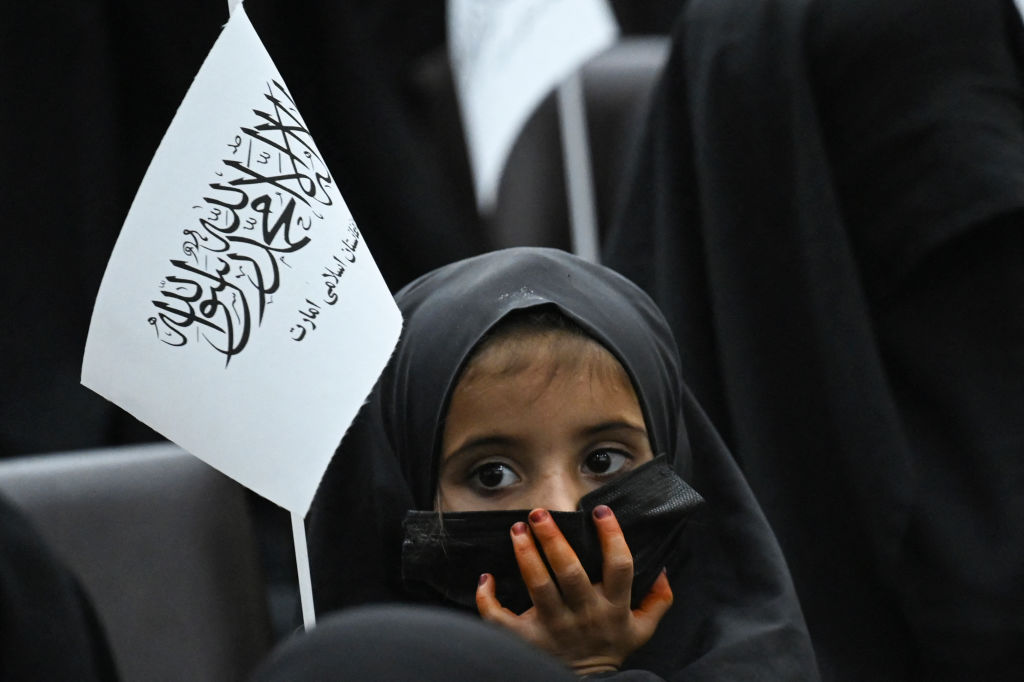Taliban says Afghan women can continue college, but not alongside men and only in Islamic dress


A free daily email with the biggest news stories of the day – and the best features from TheWeek.com
You are now subscribed
Your newsletter sign-up was successful
The Taliban on Sunday announced that Afghan women will be allowed to continue studying at universities, including post-graduate studies, but universities will be strictly segregated by gender and women must dress in burqas. "We will not allow boys and girls to study together," said Abdul Baqi Haqqani, higher education minister in the Taliban's new all-male government. "We will not allow co-education."
Haqqani also said the new government will review the subjects being taught, but added that he wants Afghan university graduates to be competitive with their peers in the region and the world.
The last time the Taliban governed Afghanistan, from 1996 to 2001, they barred girls and women from education and most other aspects of public life. Once the U.S. toppled the Taliban and helped set up a new government, universities were coed and there was no dress code — though, The Associated Press notes, "the vast majority of female university students opted to wear headscarves in line with tradition." Haqqani said "we will start building on what exists today," not try to turn the clock back 20 years.
The Week
Escape your echo chamber. Get the facts behind the news, plus analysis from multiple perspectives.

Sign up for The Week's Free Newsletters
From our morning news briefing to a weekly Good News Newsletter, get the best of The Week delivered directly to your inbox.
From our morning news briefing to a weekly Good News Newsletter, get the best of The Week delivered directly to your inbox.
When the Taliban seized power and in the months before, it tried to assure the world and fellow Afghans that it had changed over the past 20 years and would allow a more inclusive society, within limits. But women are barred from sports and the Taliban has banned and violently suppressed protests in the past week, including from women demanding greater rights.
There are "tens of thousands of urban Afghans who had until recently spent their adult lives in a country propped up by Western forces, surrounded by the liberal rhetoric that came alongside two decades of war," The Washington Post reports. "While the billions of dollars spent on the country's security forces and government vanished with the Taliban takeover, this generation of young Afghans determined to live in a more tolerant society could be one of the few enduring legacies of foreign intervention and investment here."
"The Taliban call us the 'American generation,' and they try to say we are not Muslims because we have been influenced by Western thoughts," Rohullah Raziqi, a local journalist in Kabul who has now joined the protests, told the Post. "But it's not true. I just believe in freedom."
A free daily email with the biggest news stories of the day – and the best features from TheWeek.com
Peter has worked as a news and culture writer and editor at The Week since the site's launch in 2008. He covers politics, world affairs, religion and cultural currents. His journalism career began as a copy editor at a financial newswire and has included editorial positions at The New York Times Magazine, Facts on File, and Oregon State University.
-
 How the FCC’s ‘equal time’ rule works
How the FCC’s ‘equal time’ rule worksIn the Spotlight The law is at the heart of the Colbert-CBS conflict
-
 What is the endgame in the DHS shutdown?
What is the endgame in the DHS shutdown?Today’s Big Question Democrats want to rein in ICE’s immigration crackdown
-
 ‘Poor time management isn’t just an inconvenience’
‘Poor time management isn’t just an inconvenience’Instant Opinion Opinion, comment and editorials of the day
-
 Operation Rubific: the government's secret Afghan relocation scheme
Operation Rubific: the government's secret Afghan relocation schemeThe Explainer Massive data leak a 'national embarrassment' that has ended up costing taxpayer billions
-
 British warship repels 'largest Houthi attack to date' in the Red Sea
British warship repels 'largest Houthi attack to date' in the Red SeaSpeed read Western allies warn of military response to Iranian-backed Yemeni rebels if attacks on ships continue
-
 Houthi rebels claim Red Sea ship attacks
Houthi rebels claim Red Sea ship attacksspeed read Iran-backed Yemeni group vows to escalate aggression towards Israel-linked vessels in revenge for Gaza war
-
 Israel plans next phase of Gaza war as first hostages released
Israel plans next phase of Gaza war as first hostages releasedSpeed read After four-day ceasefire 'we will not stop' until destruction of Hamas, says Israel
-
 Mob storms Russian airport 'looking for Jews'
Mob storms Russian airport 'looking for Jews'Speed Read Plane from Israel surrounded by rioters chanting antisemitic slogans after landing in Russia's Dagestan region
-
 Tuberville's military promotions block is upending lives, combat readiness, 3 military branch chiefs say
Tuberville's military promotions block is upending lives, combat readiness, 3 military branch chiefs saySpeed Read
-
 Ukraine's counteroffensive is making incremental gains. Does it matter in the broader war?
Ukraine's counteroffensive is making incremental gains. Does it matter in the broader war?Speed Read
-
 US commissions first-ever Navy ship in a foreign port
US commissions first-ever Navy ship in a foreign portSpeed Read
